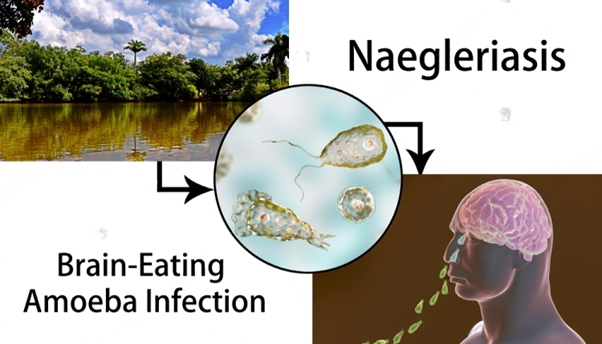Introduction
In a devastating incident that has left a community in Kerala, India, heartbroken, a 15-year-old boy tragically lost his life to a rare and destructive brain infection called primary amoebic meningoencephalitis (PAM). This formidable infection is caused by Naegleria fowleri, commonly known as the “brain-eating amoeba.” A week before his passing, the boy first experienced a fever and sought medical help at a nearby clinic.1,2
The stream near the boy’s residence, where he often bathed, is believed to be the probable origin of the Naegleria fowleri infection. Naegleria fowleri thrives in warm freshwater environments, underscoring the importance of understanding its symptoms and exploring potential treatments.1,2
What is a Brain-eating Amoeba? 2
The brain-eating amoeba is an uncommon and lethal unicellular creature that can potentially induce a severe brain infection known as PAM (Primary Amoebic Meningoencephalitis). It primarily inhabits warm freshwater surroundings, including lakes, hot springs, and inadequately maintained swimming pools. This amoeba infiltrates the body through the nasal passage, often during swimming or diving activities, and proceeds to the brain, resulting in inflammation and the destruction of brain tissue. PAM represents a highly aggressive infection with a significantly high mortality rate, and occurrences of this condition are exceedingly rare.
Identifying the Symptoms1
The incubation period for Naegleria fowleri infection, which can lead to PAM, is typically one week. Commonly observed brain-eating amoeba symptoms include:
Severe Headache: A persistent and intense headache is one of the prominent brain-eating amoeba symptoms experienced by infected individuals.
High Fever: A high-grade fever frequently accompanies the infection, exacerbating the individual’s declining state of health.
Nausea and Vomiting: Brain-eating amoeba infection often leads to gastrointestinal discomfort, manifesting as symptoms like nausea and vomiting.
Stiff Neck: Inflammation of the meninges, the protective membranes surrounding the brain, can result in a stiff neck, serving as an indicator of brain-eating amoeba infection.
Confusion: As the infection advances, people may encounter confusion and cognitive decline, leading to difficulty focusing and communicating clearly.
Seizures: Brain-eating amoeba infection can trigger seizures of varying severity and frequency.
Hallucinations: Some infected individuals may report hallucinations or delusions, further complicating their condition.
As the infection advances, the patient’s health deteriorates rapidly. The development of a coma and, ultimately, death is an unfortunate outcome associated with brain-eating amoeba infection. The swift destruction of brain tissue by Naegleria fowleri contributes to the alarmingly high brain-eating amoeba mortality rate. Despite the availability of advanced treatments, brain-eating amoeba infection is often fatal.
Is there a cure? 1,2
Treating Naegleria fowleri infection (brain-eating amoeba) is complex and challenging. Early detection and prompt intervention are pivotal factors that can improve the chances of survival. The current approach employs antifungal and antimicrobial medications, including amphotericin B, and supportive therapies to treat brain-eating amoeba. These treatments aim to reduce inflammation, manage symptoms, and support critical care. Due to the infection’s aggressive nature and the limited effectiveness of available therapies, the prognosis remains unfortunately unfavourable.

Emphasizing Prevention and Awareness1,2
It is crucial to emphasize preventive measures to mitigate the risk of Naegleria fowleri infection. By adopting simple yet effective strategies, individuals can significantly reduce their exposure to this devastating amoeba. To avoid infection, avoid swimming in poorly chlorinated warm freshwater bodies. Use well-maintained pools or treated water. Use nose clips during water activities to prevent contamination through the nose. Practice nasal hygiene with sterile water, especially during cultural or religious nasal cleansing rituals.

Conclusion
In Conclusion, Naegleria fowleri infection, often called the “brain-eating amoeba,” poses a rare yet severe threat. Understanding its symptoms, exploring potential treatments, and emphasizing preventive measures are essential to combating this deadly infection. Prioritizing public awareness and responsible practices can collectively work towards reducing the brain-eating amoeba mortality rate and ensuring a safer future for all.
References
- Kerala boy dies due to brain-eating amoeba: What’s it all about, and how can it infect you? [Cited: 11 July 2023]. Available from: https://indianexpress.com/article/health-wellness/kerala-boy-dies-brain-eating-amoeba-what-how-8809693/
- Brain-eating amoeba: Know all about the rare disease that killed a Kerala boy. [Cited: 11 July 2023]. Available from: https://www.healthshots.com/health-news/brain-eating-amoeba-infection/




